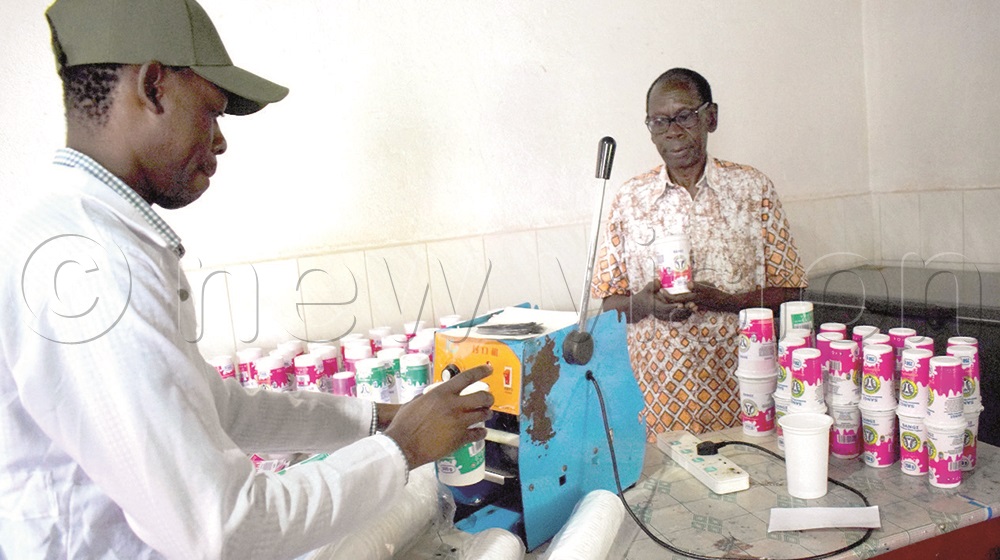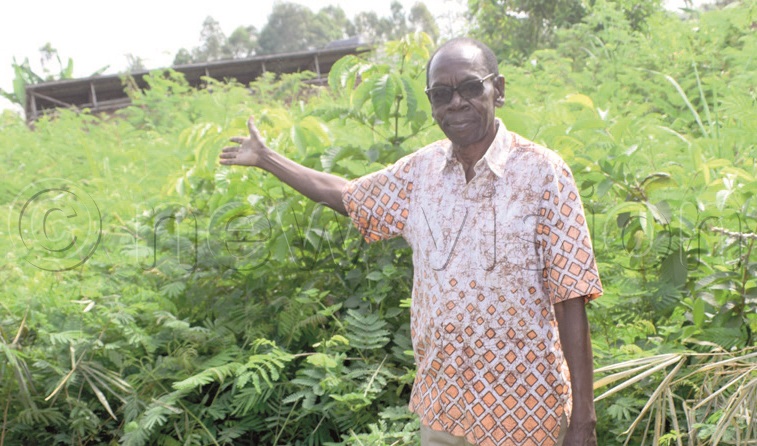For the tenth year running, Vision Group, together with the Embassy of the Netherlands, KLM Airlines, dfcu Bank and Koudijs Nutrition BV, is running the Best Farmers Competition. The 2025 competition will run from April to November, with the awards in December. Every week, Vision Group platforms will publish profiles of the farmers. Winners will walk away with sh150m and a fully paid-for trip to the Netherlands.
When Fabian Wakholi Bungoko, of Bungokho sub-county, Mbale district, retired from public service 12 years ago, he wondered how he would provide for himself and his family.
He already had his gratuity package, but he had vowed not to touch that money until he had a viable investment idea.
Reflecting back with dread, the former district education officer had witnessed many sad instances of his contemporaries who had retired before him now drowning in abject poverty and depression due to poor planning.
“I avoided falling into that trap by making consultations,” he says.
A conversation on the future with his wife Catherine Wakholi, a teacher with a few years to retirement and mother of their nine children at the time, would draw a long list of investment ideas.
The list was narrowed down to two: constructing a school and establishing a dairy farm. The couple chose to set up a dairy farm and consulted other farmers and experts.
The dairy farm received a boost five years later when Catherine retired as a headteacher and invested her gratuity in the enterprise.
Prior dairy farm preparations
Before procuring the pioneer stock, the couple allocated part of their 15-acre parcel to grow fodder.

Wakholi (right) with his worker during the production process of Sangi Farm Yoghurt. (Photos by Wilson Asiimwe)
“Other farmers had advised us to have fields of a variety of fodder. These included Napier, sweet potato vines, desmodium and calliandra,” Catherine says.
Other critical undertakings were the construction of a cow-shed using concrete, metal rails and iron sheets that can accommodate 24 animals.
Pioneer dairy animal stock
The couple kick-started Sangi Dairy Farm Enterprise in 2010 with five in-calf Jersey cows, each at sh2m, spending a total of sh10m.
They bought the cows from Kapchorwa and neighbouring Kenya. Over the years, the pioneer stock was cross-bred with Friesians.
From the farm records, they have had 50 cows over the years.
“We sell off ageing cattle to maintain milk production,” Catherine says.
Today, the farm has 20 high-milking cows. The maiden daily milk production was 30lts.
Over time, the capacity has scaled up to more than 100lts. However, the farm occasionally realises a production shortfall, particularly when a sizeable proportion of the cows are in gestation.
Sangi dairy yoghurt
From the start, the couple decided to add value to their produce.
Catherine says through research, they learnt that there was a vibrant market for yoghurt. At an average daily milk production of about 120lts, the farm allocates 100lts for yoghurt.
The rest is reserved for the daily raw milk clientele. Emmanuel Madoi, the farm manager, says Sangi Farm Yoghurt brand has a daily yoghurt production of 50lts.
The product is packed in quantities of 250ml and 500ml. At the inception of the farm, Catherine visited urban areas in the eastern region seeking markets for their products.
“We got orders from supermarkets and big shops,” Catherine says. The task has since been delegated to two professional marketers.
Clientele for Sangi Dairy Yoghurt has grown, with their market extending as far as Soroti, Gulu, Lira districts and the Karamoja sub-region.
Ensuring security
Since the project started, the couple has built rapport with the district veterinary office for guidance and treatment of the animals.

They have also fenced off their home to prevent animals from the neighbourhood mingling with their livestock, which could lead to the spread of disease.
Impact on the community
Apart from supplying dairy products, the farm regularly attracts groups of aspiring dairy farmers.
The couple walks the groups through the basics, ranging from feeding to dairy product handling.
They have testimonies from many community members who started dairy farming after visiting the farm.
Best management practices
They advise those aspiring to engage in dairy farming to always consult experts (veterinary physicians).
“Their advice should be taken religiously, lest a farmer suffers untold losses because exotic animals are not only alien to most farmers but are also very delicate and sensitive. Case in point: serving them bad feeds would render them ill and lead to death,” Wakholi says.
Family involvement
The entire family is supportive. However, now that many of the children are out of school and employed in different fields, they tend to have very little time to adopt hands-on management skills due to pressure from their workplaces.
Some of the children have spared some time to come home and have keenly appreciated the management of the enterprise.
“We hope that the few children who are keenly interested in the enterprise will take over when we are long gone,” he observes.
Achievements
The Wakholis are delighted that the enterprise has created employment for 12 people.
“These include marketers and labourers,” Catherine says.
Most importantly, the proceeds from the farm have enabled them to educate their nine children, who have since completed school and secured jobs.
The couple has used proceeds from the farm to excavate a deep water well, which now provides clean and safe water for their household and animals.
This has relieved them from the burden of water bill expenses. With proceeds from the enterprise, they furnished the yoghurt wing with all the necessary machinery.
The most recent addition is an ice-cream machine worth sh20m.
Challenges
The couple says running the enterprise has not been a walk in the park. The greatest challenge is disease outbreaks that result in the sudden death of animals.
“Among the grim episodes have been waking up in the morning only to find one of the well-tended cows lying on the ground dead,” Catherine says.
She says sudden deaths have always been a considerably haunting experience.
“On top of losing an animal whose cost is prohibitive, one is compelled to commit a substantive amount of money for an expert to investigate the cause of death, lest the rest of the animals are also lost,” she says.
At times, they have had to contend with the loss of a lot of money on animals presumed to offer high dairy yields, only for the results to be contrary.
The Wakholis have also been victims of unscrupulous marketers.
Wakholi says the nature of their business has tolerated the concept of clients paying after the sale of yoghurt.
The clients are supplied with yoghurt and given ample time to sell the products and make remittances later.
However, because the clients are in various urban areas, unscrupulous marketers make collections and vanish,” Wakholi, who has since adjusted the payment protocol, said.
The couple is still reeling from the loss they suffered during the COVID-19 lockdown.
“During the total lockdown, we could hardly market our products and at around the same time the farm was struck by a strange disease outbreak.
“Faced with a serious financial crisis at the time, we could not afford timely treatment and five animals died,” Wakholi says.
Lessons shared with other farmers
Wakholi says in the beginning, they would opt for artificial insemination when their cows went on heat.
However, repeated and costly procedures that yielded nothing compelled them to opt for the natural process.
“The decision came after a couple of animals were served with artificial insemination more than five times without success,” Wakholi says.
Interactions with other farmers revealed that they had experienced the same, but found lasting solutions.
“When he lent us his bull, it served our cows and they all conceived,” Wakholi says.
Since then, the Wakholis have committed money to purchasing bulls specifically to serve the cows and the strategy has always worked.
“We keep on acquiring bulls and disposing them of in order to avoid inbreeding,” he says.
Plans
The couple dreams of diversifying into making ice cream.
“The beginning is humble, but we look forward to expanding our frontiers by buying more ice-cream machines that shall be installed in numerous urban centres in the region.”
Background
Born to Joseph Tsebayo and Glades Mukhaye Nyondo in Mbale district 79 years ago, Wakholi went to Nyondo Demonstration Primary School, then proceeded to Nabumali High School.
He later joined Makerere University to pursue a bachelor’s degree in education.
After upgrading, he briefly lectured at the faculty of education, Makerere University, before becoming academic registrar at Nagongera National Teacher Training College in Tororo.
He later lectured in the faculty of education at Islamic University in Uganda for 10 years.
He applied and succeeded in 1997 when the office of district education officer Mbale fell vacant. He retired from that position in 2008.
Catherine joined the education field as a secondary school teacher. She retired when she had been elevated to the level of headteacher.





